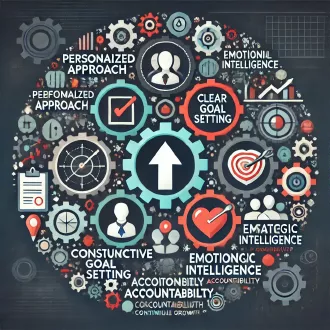Transcription What does leadership coaching pursue?
Leadership coaching is characterized by its focus on achieving specific objectives and enhancing the skills of leaders and managers. Through a process of constructive dialogue, leadership coaching pursues multiple purposes that converge to drive effective growth and performance in a dynamic and challenging organizational environment.
The process is based on a deep recognition that leadership is not merely a title, but a set of skills and attributes that can be cultivated and enhanced with guidance and practice.
By exploring the main aspects pursued by this type of coaching, a deeper understanding emerges of how the key purposes of coaching and leadership evolution are amalgamated.
Among the key purposes pursued by leadership coaching are:
- The development of leadership skills: this constitutes a central component of leadership coaching. Through the assistance and guidance provided by the coach, leaders work to strengthen essential skills such as communication, decision-making, team management and conflict resolution. These competencies stand as pillars that support effective leadership and a positive impact on the team and the organization as a whole. By identifying areas for improvement and establishing a connection between performance objectives and skill development, leaders can overcome obstacles and achieve significant improvements in their performance.
- Self-awareness and self-assessment: the leadership coaching process promotes self-awareness, which means that leaders take time to reflect on their leadership style, strengths and areas for improvement. This allows leaders to understand how their behavior affects their team and how they can adjust their approach for greater positive impact.
- Empathy and relationship management: leadership coaching fosters empathy and the ability to understand and connect with team members. Leaders learn how to build strong relationships, address conflict constructively and create a collaborative work environment.
- Change management and adaptability: In an ever-changing business environment, leaders must be able to lead change and adapt to new circumstances. Leadership coaching helps leaders strengthen their agility and ability to guide their teams through these changes.
- Inspiration and motivation: Leadership coaching pursues the ability to inspire and motivate teams. Leaders learn to foster a sense of purpose, set challenging goals and create an environment in which team members are motivated to reach their full potential.
- Building Successful Teams: Leadership coaching focuses on developing skills to build and lead successful teams. Leaders learn to recognize the unique skills of team members, foster collaboration, and address challenges that may arise in teamwork.
- Personal and professional development: in addition to specific leadership skills, coaching seeks the personal and professional growth of the whole person. This includes improving emotional intelligence, stress management, resilience and the ability to maintain a healthy work-life balance.
objectives coaching leadership




